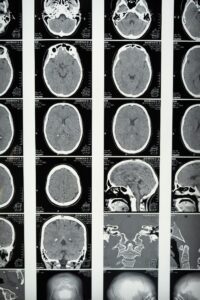 Depression is commonly known as a pervasive sense of sadness. It’s often not something thought of from a tangible standpoint. However, like any illness, it has physical effects on the body.
Depression is commonly known as a pervasive sense of sadness. It’s often not something thought of from a tangible standpoint. However, like any illness, it has physical effects on the body.
Not only does depression affect our bodies through fatigue and appetite changes—it also has specific effects on the brain.
Let’s look at how depression affects your brain.
Depression’s Effects on the Brain
Brain Size
 Many of us probably don’t think much about the size of our brain and how it can change. But more studies are showing that depression may affect the overall size of your brain—it causes shrinkage.
Many of us probably don’t think much about the size of our brain and how it can change. But more studies are showing that depression may affect the overall size of your brain—it causes shrinkage.
What’s believed to be happening is particular areas (which we will look at below) lose gray matter volume (GMV), meaning some brain cells are dying. This is seen more in people with depression and other mental illnesses than those without.
The key parts of the brain affected by depression-related shrinkage are:
- The hippocampus: This plays a key role in learning and memory. It also connects to other parts of your brain responsible for emotions and stress regulation.
- The prefrontal cortex: This area is known for high-level thinking and planning skills.
- The amygdala: This is a small gland that also plays a role in emotional regulation and memory.
- The thalamus: This is responsible for relaying information from the brain’s outer layer to the brain stem.
When these areas shrink, their ability to perform their function effectively decreases. As you can imagine, shrinkage in these areas has a direct effect on emotional regulation.
Inflammation
Inflammation can occur pretty much anywhere in the body, including your brain. In some people with depression, atypical immune responses happen. Depending on the length and severity of depression, different people may have different levels of inflammation.
It’s believed that inflammation can influence brain shrinkage and inhibit neuroplasticity (the ability of the brain to change and learn over time). Inflammation may also lead to dysfunction in some neurotransmitters, which also play a key role in mental health.
Structural Discrepancies
As mentioned above, there are certain neurotransmitters connected to depression, specifically serotonin, dopamine, and norepinephrine.
Studies show that depressed people have an imbalance in neurotransmitters—namely when it comes to balancing excitatory and inhibitory neurotransmitters. This imbalance may play a role in shrinkage, too.
Think of it like this: Your brain operates on circuits of sorts. When too much or too little activity occurs in a circuit, things fall out of balance and become what we know as mental illnesses like depression.
Restricted Oxygen
Reduced oxygen levels may be related to changes in breathing caused by depression, however, it’s unclear yet which happens first—the reduced oxygen or depression.
 Nonetheless, your body naturally produces a protein (HIF-1) in response to reduced oxygen to the brain (hypoxia). Initial studies have shown that in those with depression and bipolar disorder, the HIF-1 protein is more prevalent.
Nonetheless, your body naturally produces a protein (HIF-1) in response to reduced oxygen to the brain (hypoxia). Initial studies have shown that in those with depression and bipolar disorder, the HIF-1 protein is more prevalent.
Although more studies need to be done, it doesn’t change the fact that the brain is very sensitive to changes in oxygen, which can lead to issues like inflammation and brain cell injury. As mentioned above, inflammation and shrinkage/cell death are connected to issues with mood and memory.
Undoing the Effects of Depression
The good news is that the effects of depression are reversible. Studies show that treatment with therapy, medication, or a combination of both reverse some of the physical effects of depression, reducing inflammation and allowing new synaptic connections to be made.
Regardless, depression is complex and everyone experiences it a little differently. What remains a common truth though, is that you deserve happiness and the help that will get you there.
If you’re struggling with depression, please don’t hesitate to reach out today to schedule a consultation call. Click here to learn more about depression therapy.





